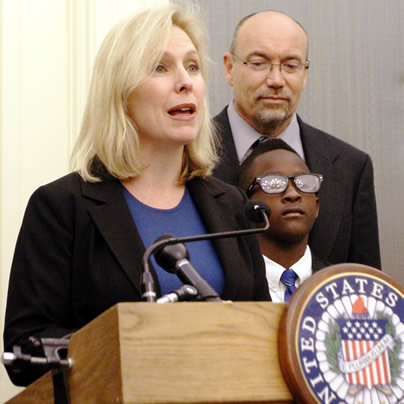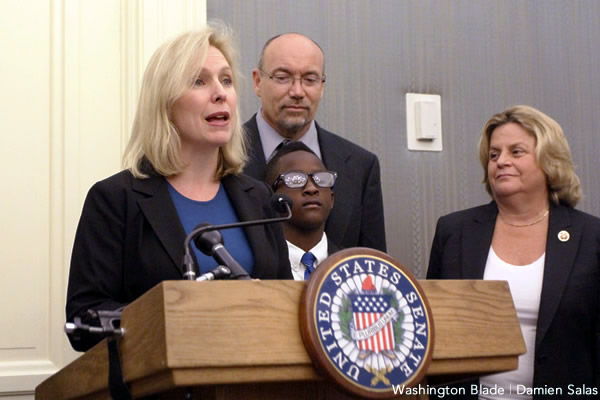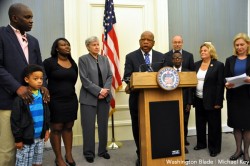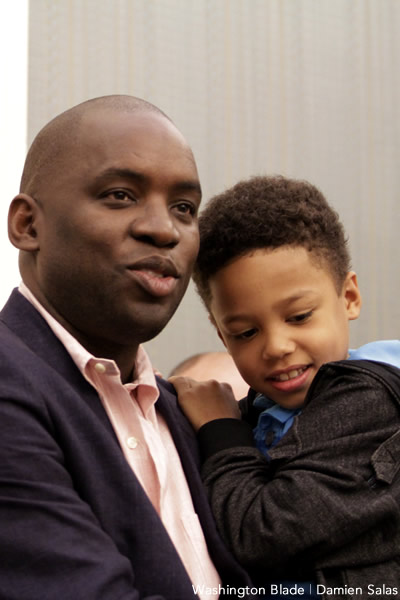Politics
Gillibrand to reintroduce adoption anti-discrimination bill
Every Child Deserves a Family Act would restrict federal funds for anti-gay agencies


Sen. Kirsten Gillibrand (D-N.Y.) announces plans to reintroduce the Every Child Deserves a Family Act (Washington Blade photo by Damien Salas)
Sen. Kirsten Gillibrand (D-N.Y.) is leading a group of lawmakers in the House and Senate who are preparing to introduce legislation that would prohibit bias in adoption services against gay couples seeking to adopt.
The legislation, known as the Every Child Deserves a Family Act, would restrict federal funds for public child welfare agencies if they have laws or practices allowing for discrimination in adoption on the basis of marital status, sexual orientation or gender identity. The bill would also prohibit discrimination against LGBT children seeking families.
Gillibrand emphasized the importance of the legislation on Tuesday during a news conference on Capitol Hill as a means to ensure LGBT families seeking to adopt can do so without fear of anti-gay bias.
As Gillibrand noted, no state laws protect LGBT families seeking to adopt in more than 30 states, although six states — California, Massachusetts, New Jersey, Rhode Island, Wisconsin and Oregon — explicitly ban discrimination in adoption based on sexual orientation.
“This patchwork of state laws often lead our children across the children across the country without the opportunity for a safe home and loving parents,” Gillibrand said. “Meanwhile, there’s an untapped pool of 2 million LGBT people, people who are willing to become adoptive or foster parents, according to the Williams Institute at UCLA.”
According to Gillibrand’s office, an estimated 400,000 children in the U.S. foster care system nationwide, and more than 104,000 children are currently waiting to be adopted, including 6,400 in New York.

Rep. John Lewis (D-Ga.) speaks at news conference against anti-gay bias in adoption (Washington Blade photo by Michael Key)
In the House, the lead sponsor of the legislation is Rep. John Lewis (D-Ga.), a leader in the 1960’s black civil rights movement, who’s taking over the bill along with Rep. Ileana Ros-Lehtinen (R-Fla.) now that its former patron, former Rep. Pete Stark, has retired from Congress.
“I’ve fought too long and too hard against discrimination of every kind not to serve as a champion for this bill,” Lewis said. “Foster children are innocent bystanders when troubled families crash and burn. The foster care system does it best to rescue these little babies from the flames of abuse — neglect, drug addiction, domestic violence and some of societies worse problems.”
Among the chief LGBT organizations behind the legislation is the Family Equality Council. Emily Hecht-McGowan, the Family Equality Council’s, director of public policy, issued a statement saying the bill is important to find loving homes for children.
“Our country has an obligation to care for its most vulnerable children, and we can do better for the 104,000 youth in foster care who are searching for a home,” Hecht-McGowan said. “The time has come to fix the patchwork of adoption and foster care laws across the country and ensure that young people in care have every opportunity to find a forever home.”
The legislation wasn’t introduced on the same day as the news conference. Steve Majors, a spokesperson for the Family Equality Council, said a “Dear Colleague” letter went out on Tuesday asking lawmakers to sign on in support of the bill in anticipation of introduction at later date.
Speaking with the Washington Blade after the news conference, Gillibrand said the first step in the process to guiding the legislation toward passage this year is building co-sponsorship for the bill — particularly finding a lead GOP co-sponsor in the Senate.
“Right now, we’re working on co-sponsors,” Gillibrand said. “We’ll be working across the aisle to find a lead Republican, and hopefully then garner a broad base of support within the Senate, and then we’ll move forward in the Senate and move forward in the House and try to get this passed this year.”
Asked whether she’s spoken to Sen. Rob Portman (R-Ohio), who recently came out in favor of marriage equality after learning his son is gay, about the legislation, Gillibrand replied, “We’re still working on it.”
As noted by The Huffington Post, one potential supporter for the legislation in the House could be Rep. Paul Ryan (R-Wis.), who said during a town hall that he supports adoption rights for gay couples, although he continues to oppose same-sex marriage.
“I do believe that if there are children who are orphans who do have a loving person or couple — I think if a person wants to love and raise a child they ought to be able to do that. Period. I would vote that way,” Ryan said.
Ryan’s office didn’t immediately respond to the Blade’s request to comment on whether he’d support the Every Child Deserves a Family Act.
During the news conference, a number of gay people and their children spoke out about the importance that adoption has meant for their families. Among them was Martin Gill, a gay foster dad, and his eight-year-old son, Nathaniel, who spoke publicly at the news conference for the first time.
Gill filed a lawsuit against Florida to allow him to adopt Nathaniel and his brother. That challenge led the state in 2010 to stop enforcing its 33-year-old law prohibiting openly gay people from adopting.
“It was not so much the fact that we were going to be discriminated against; it was the fact that they were going to split two young brothers up that had always been together, that had come together into our home, that by the time of our adoption, had been with us for six years at the time of our adoption,” Gill said. “That’s what really led to our journey. That’s something that no foster children should have to go through; it’s also something that no adoptive parent should have to go through.”
Also at the news conference was Mary Keane, a lesbian New York City resident and retired health care consultant, used her savings to buy a 12-bedroom house and intended it to become a safe-haven for LGBT teens rejected by their families. Instead, she became a foster mother for troubled adolescents. Keane has formally adopted six children and plans to adopt four more.

Philip McAdoo and his seven-year-old son Zaden (Washington Blade photo by Damien Salas)
“Many of my kids, they never, never cared about my sexual orientation,” Keane said. “It was about as irrelevant as you could possibly get. Having parented for 13 years now, what I’ve found is that, if anything, they learn a lot. Some of my kids have written award-winning essays about marriage equality and why gays should be allowed to marry.”
Anni Keane, one of Keane’s daughters who’s now an adult, teared up during the news conference as she talked about the importance of having a mother, saying, “Thank God she decided to be a parent for me. Because she stepped forward, I have a mom, and my daughter has a grandmother.”
Philip McAdoo, a gay Atlanta, Ga., resident and graduate student at the University of Pennsylvania, talked about the experience that he and his partner, Sean Cavanaugh, had after the two-year process that led them to adopt their son Zaden, who’s now seven years old.”
“When we started talking about family, he said, ‘Oh, I what’s important in a family,'” McAdoo said. “We were like, ‘What’s that?’ He said, ‘Where there’s love.’ There was never a question that there were two dads; he always wanted to know who was going to play football with him.”
Jody Huckaby, executive director for PFLAG National, said in a statement his organization in its 40 years of existence has “seen the positive effects parental support” can have on a child — regardless of the sexual orientation of the parent.
“Why, then, should more than 400,000 children remain in foster care—104,000 of whom are eligible for adoption—when they could receive this support from loving, capable, and qualified lesbian, gay, bisexual, and transgender parents?” Huckaby said. “This is truly discrimination at its worst: hurtful to the people who are being denied the opportunity to become parents, and harmful to thousands of vulnerable children being denied the opportunity for stable, loving, permanent homes.”
Congress
Congress passes ‘Big, Beautiful Bill’ with massive cuts to health insurance coverage
Roughly 1.8 million LGBTQ Americans rely on Medicaid

The “Big, Beautiful Bill” heads to President Donald Trump’s desk following the vote by the Republican majority in the U.S. House of Representatives Thursday, which saw two nays from GOP members and unified opposition from the entire Democratic caucus.
To partially offset the cost of tax breaks that disproportionately favor the wealthy, the bill contains massive cuts to Medicaid and social safety net programs like food assistance for the poor while adding a projected $3.3 billion to the deficit.
Policy wise, the signature legislation of Trump’s second term rolls back clean energy tax credits passed under the Biden-Harris administration while beefing up funding for defense and border security.
Roughly 13 percent of LGBTQ adults in the U.S., about 1.8 million people, rely on Medicaid as their primary health insurer, compared to seven percent of non-LGBTQ adults, according to the UCLA School of Law’s Williams Institute think tank on sexual orientation and gender identities.
In total, the Congressional Budget Office estimates the cuts will cause more than 10 million Americans to lose their coverage under Medicaid and anywhere from three to five million to lose their care under Affordable Care Act marketplace plans.
A number of Republicans in the House and Senate opposed the bill reasoning that they might face political consequences for taking away access to healthcare for, particularly, low-income Americans who rely on Medicaid. Poorer voters flocked to Trump in last year’s presidential election, exit polls show.
A provision that would have blocked the use of federal funds to reimburse medical care for transgender youth was blocked by the Senate Parliamentarian and ultimately struck from the legislation — reportedly after the first trans member of Congress, U.S. Rep. Sarah McBride (D-Del.) and the first lesbian U.S. senator, Tammy Baldwin (D-Wis.), shored up unified opposition to the proposal among Congressional Democrats.
Congress
Ritchie Torres says he is unlikely to run for NY governor
One poll showed gay Democratic congressman nearly tied with Kathy Hochul

Gay Democratic Congressman Ritchie Torres of New York is unlikely to challenge New York Gov. Kathy Hochul (D) in the state’s next gubernatorial race, he said during an appearance Wednesday on MSNBC’s “Morning Joe.”
“I’m unlikely to run for governor,” he said. ““I feel like the assault that we’ve seen on the social safety net in the Bronx is so unprecedented. It’s so overwhelming that I’m going to keep my focus on Washington, D.C.”
Torres and Hochul were nearly tied in a poll this spring of likely Democratic voters in New York City, fueling speculation that the congressman might run. A Siena College poll, however, found Hochul leading with a wider margin.
Back in D.C., the congressman and his colleagues are unified in their opposition to President Donald Trump’s signature legislation, the “Big Beautiful Bill,” which heads back to the House after passing the Senate by one vote this week.
To pay for tax cuts that disproportionately advantage the ultra-wealthy and large corporations, the president and Congressional Republicans have proposed massive cuts to Medicaid and other social programs.
A provision in the Senate version of the bill that would have blocked the use of federal funds to reimburse medical care for transgender youth was blocked by the Senate Parliamentarian and ultimately struck from the legislation, reportedly after pressure from transgender U.S. Rep. Sarah McBride (D-Del.) and lesbian U.S. Sen. Tammy Baldwin (D-Wis.).
Torres on “Morning Joe” said, “The so-called Big Beautiful Bill represents a betrayal of the working people of America and nowhere more so than in the Bronx,” adding, “It’s going to destabilize every health care provider, every hospital.”
Congress
House Democrats oppose Bessent’s removal of SOGI from discrimination complaint forms
Congressional Equality Caucus sharply criticized move

A letter issued last week by a group of House Democrats objects to Treasury Secretary Scott Bessent’s removal of sexual orientation and gender identity as bases for sex discrimination complaints in several Equal Employment Opportunity forms.
Bessent, who is gay, is the highest ranking openly LGBTQ official in American history and the second out Cabinet member next to Pete Buttigieg, who served as transportation secretary during the Biden-Harris administration.
The signatories to the letter include a few out members of Congress, Congressional Equality Caucus chair and co-chairs Mark Takano (Calif.), Ritchie Torres (N.Y.), and Becca Balint (Vt.), along with U.S. Reps. Nikema Williams (Ga.), Hank Johnson (Ga.), Raja Krishnamoorthi (Ill.), Delia Ramirez (Ill.), Joyce Beatty (Ohio), Lloyd Doggett (Texas), Eleanor Holmes Norton (D.C.), Josh Gottheimer (N.J.), and Sylvia Garcia (D-Texas).
The letter explains the “critical role” played by the EEO given the strictures and limits on how federal employees can find recourse for unlawful workplace discrimination — namely, without the ability to file complaints directly with the Employment Opportunity Commission or otherwise engage with the agency unless the complainant “appeal[s] an agency’s decision following the agency’s investigation or request[s] a hearing before an administrative judge.”
“Your attempt to remove ‘gender identity’ and ‘sexual orientation’ as bases for sex discrimination complaints in numerous Equal Employment Opportunity (EEO) forms will create unnecessary hurdles to employees filing EEO complaints and undermine enforcement of federal employee’s nondiscrimination protections,” the members wrote in their letter.
They further explain the legal basis behind LGBTQ inclusive nondiscrimination protections for federal employees in the EEOC’s decisions in Macy v. Holder (2012) and Baldwin v. Foxx (2015) and the U.S. Supreme Court’s decision in Bostock v. Clayton County (2020).
“It appears that these changes may be an attempt by the department to dissuade employees from reporting gender identity and sexual orientation discrimination,” the lawmakers wrote. “Without forms clearly enumerating gender identity and sexual orientation as forms of sex discrimination, the average employee who experiences these forms of discrimination may see these forms and not realize that the discrimination they experienced was unlawful and something that they can report and seek recourse for.”
“A more alarming view would be that the department no longer plans to fulfill its legal obligations to investigate complaints of gender identity and sexual orientation and ensure its
employees are working in an environment free from these forms of discrimination,” they added.
-

 Virginia2 days ago
Virginia2 days agoDefying trends, new LGBTQ center opens in rural Winchester, Va.
-

 South Africa5 days ago
South Africa5 days agoLesbian feminist becomes South African MP
-

 Travel4 days ago
Travel4 days agoManchester is vibrant tapestry of culture, history, and Pride
-

 Opinions3 days ago
Opinions3 days agoUSAID’s demise: America’s global betrayal of trust with LGBTQ people











